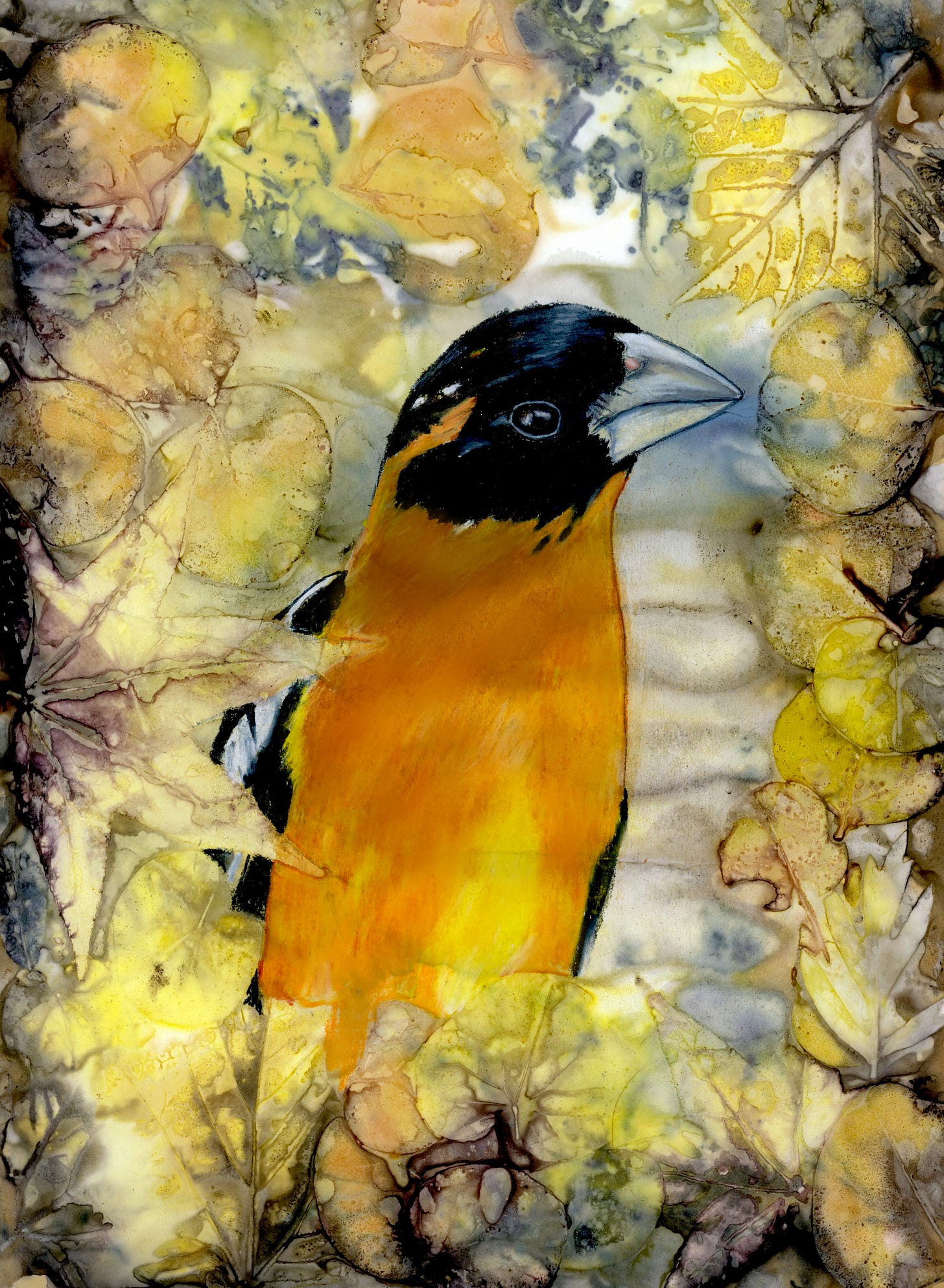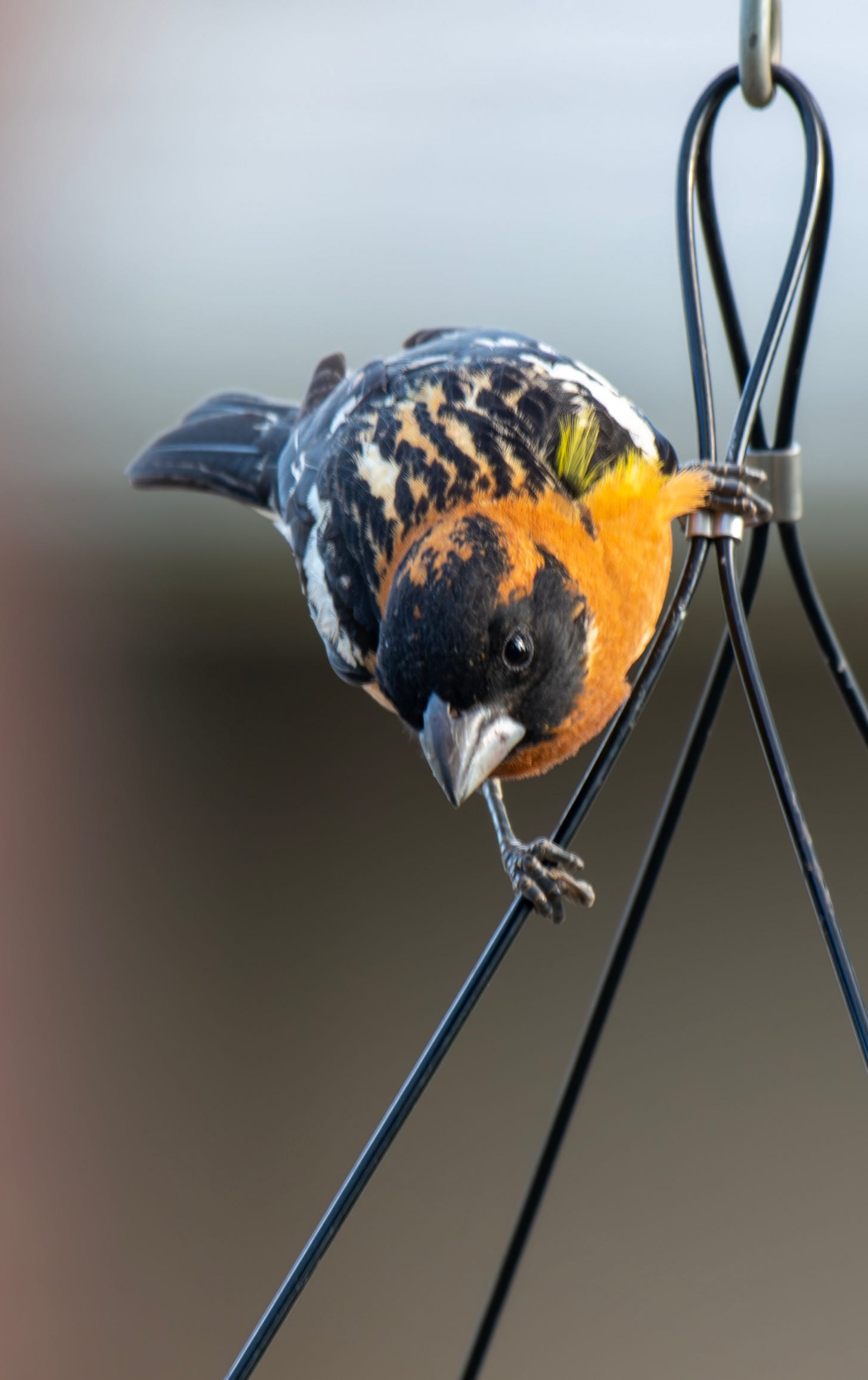An Extravagance of Grosbeaks
The Serviceberry, Slivovitz, and neighborhood gift economies
Originally Published in the SoCalNewsgroup on June 8, 2025
https://www.pressenterprise.com/2025/06/05/the-concept-of-a-gift-economy-and-its-parallel-with-nature/?share=cweaccslnrrpidnelrs5
Recently, I listened to Robin Wall Kimmerer’s book “The Serviceberry: Abundance and Reciprocity in the Natural World” knowing I would enjoy it because I love all of Kimmerer’s work. More than this, I knew the metaphor at the core of the book was wrapped around the story of birds and berries. I love birds. I love berries. However, I wasn’t expecting to find myself pondering all that I love and the sheer abundance of these gifts.
“The Serviceberry” explores the concept of gift economies and their parallel with nature. While Kimmerer gorges on serviceberries along with the cedar waxwings, she marvels over the fact that she has done nothing to earn or deserve these berries, and yet, they are gifted to her and all the wildlife that discovers them. She responds with gratitude and the desire to reciprocate. Should she weed around the tree, donate to a local land trust, offer up a song in the wind, or create art to share with others? I suspect she did all these things, but the most evident to me is, of course, her delightful 120-page love song to gifting what you have in abundance.
The turbulence of this winter and spring have left me thinking more about what I have to lose than what I have to give. Kimmerer’s book shifted my focus to begin marveling at the gift economy of my neighborhood, an economy that began when my Hungarian neighbors, Susan and Laszlo, moved in across the street.
My relationship with Susan and Laszlo began with small gifts, but we are not allowed to buy gifts. If I pick up a bottle of Slivovitz for them or order something they need from Amazon, I am not allowed to wave them off as gifts. I purchased it and dollars will be exchanged. This is not the gift economy that Kimmerer speaks of in her book. Her story is one of what we share freely when there is abundance and with no expectation of reciprocation.
When Laszlo discovers they have more produce than one older couple can eat, I will find a bag of vegetables on my porch to feed my tortoise. In turn, if I make an angel food cake and know that I have no business eating all those calories alone, I arrive with the cake at their doorstep to share.
However, it was the black-headed grosbeaks that I thought of when I read “The Serviceberry.” Susan marvels over the number of hummingbirds and songbirds at my feeders. Then she grumbles about how so few birds come to hers. When she spotted the annual influx of migrating grosbeaks and their bright, flashing wings, she needed to know the secret to attracting them. Fortunately, I had the secret in abundance. I gave her 5 pounds of black oil sunflower seed and warned her that the grosbeaks would only be here a couple weeks.
What happened because of that gift astounded me. I have fed the April flock of grosbeaks for two decades. I would guess the annual flock builds to about 40 or so birds before they head to higher elevations. Yet, one evening, sitting on my porch, I watched the feeding grosbeaks scatter from Susan’s and my yard simultaneously, startled by a passing hawk. It was as if an orange and yellow confetti cannon had been aimed into the pine trees. There were hundreds of them.
Over shots of Slivovitz and crispy csörögefánk, Susan apologized for “stealing” all my birds. I laughed and explained that she hadn’t stolen them at all. In fact, to my delight, they had somehow multiplied into an extravagance of grosbeaks the likes of which I had never seen in my yard.
That’s a gift economy. Somehow, as Kimmerer points out, the currency of gratitude and reciprocity is not so much an exchange as it is a multiplier of abundance. When I think about creating art to bolster the gift economy, I find myself inspired again. In fact, this story is an expression of my gratitude and so, the cycle continues. What a gift!





Funny thing... I saw my email notification and my first reaction was joy at receiving one again this Sunday. It is a gift that you have in abundance and share with us.